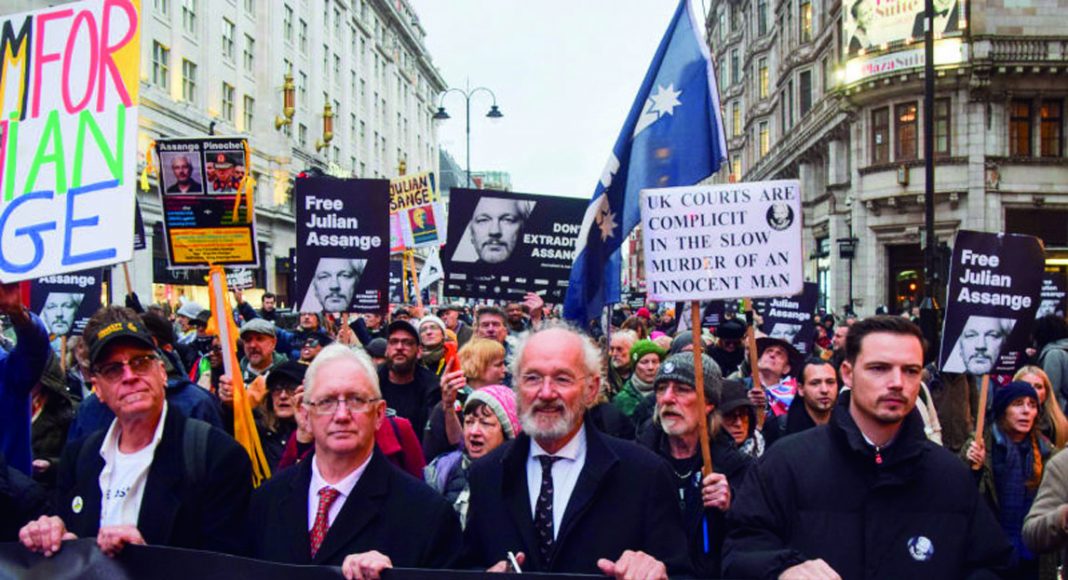The High Court has ruled that WikiLeaks editor Julian Assange may be allowed to make a further appeal against the US government’s ongoing attempts to extradite him to the US – but only if the Biden administration is unable to offer a specific set of assurances around the extradition. On 26 March 2024, Judge Victoria Sharp issued a written judgement to the effect that Assange will be given permission to appeal if the US cannot provide assurances that he would be protected by the First Amendment of the US constitution, that he would not be barred from this on the grounds of his foreign nationality and that he will not face the death penalty. The High Court has given the US until 16 April to make these assurances. SEAMUS O’TUAIRISC reports.
This follows a two-day hearing at the Royal Courts of Justice on 20-21 February, throughout which protesters demonstrated outside the court in support of Assange and to demand his freedom. Assange himself was unable to attend, either in person or via video link, due to ill health. Throughout this process, there have been reports of his deteriorating physical and mental health. Despite this, he has repeatedly been denied bail from HMP Belmarsh, where he has been detained since 2019.
Julian Assange’s alleged crimes are the publication of material that exposed US war crimes in Afghanistan and Iraq. Edward Fitzgerald KC, representing him at the February hearing, made the case that he is being persecuted for ‘ordinary journalistic practices of obtaining and publishing true classified information’. He asserted that extraditing Assange for espionage was an infringement of the extradition treaty between the US and Britain which explicitly states that a person cannot be extradited for offences of a political nature.
If extradited to the US and convicted of espionage, Assange could face up to 175 years in prison. The US has offered no assurances that he will not also be charged for other offences, particularly relating to the Vault 7 publications that exposed the capabilities of the CIA to perform electronic surveillance and cyber warfare. A former CIA operative was sentenced to 40 years in prison earlier this month for sending these documents to WikiLeaks.
Mark Summers KC, another of the barristers representing Assange, further highlighted the political motives behind the attempted extradition and prosecution. Summers explained that the prosecution’s motivation was to punish and suppress political opinion as well as to ‘prohibit and punish the exposure of state level crime’, which is contrary to both the US/UK Extradition Treaty and the Extradition Act 2003.
On the second day of the appeal hearing, Clair Dobbin KC, representing the US government, claimed that the charges were not political and that Assange had encouraged US army employee Chelsea Manning to steal diplomatic cables and military files, which were then published on WikiLeaks. Dobbin stated that Assange had gone beyond the acts of a journalist who was ‘merely gathering information’ and that the release of these documents could have posed risks such as arbitrary detention of innocent people living in war zones or under oppressive regimes. Despite this, not a single person has been confirmed as having died or otherwise being harmed as a result of these documents being released, as was confirmed after an investigation by 120 counterintelligence officers during Chelsea Manning’s sentencing hearing in 2013.
The extradition case is now formally adjourned. If the US government does not provide the requested assurances by 16 April, permission to appeal further will automatically be granted, and the case will proceed to the Court of Appeal. If the assurances are filed, there will be a further hearing on 20 May, after which Sharp and fellow judge Sir Adam Johnson will consider whether the assurances are sufficient for extradition to be agreed, or if there are nonetheless grounds to appeal further.
Even if the US government makes the assurances that the High Court has asked for, there are no mechanisms in place to ensure that it then honours these assurances, and the US has a history of reneging on diplomatic assurances.
If the assurances are made and the court considers them satisfactory, Assange’s only remaining avenue of appeal will be if he can convince the European Court of Human Rights (ECtHR) to intervene. The ECtHR could impose a Rule 39 order that would temporarily halt the extradition, pending further legal consideration.
Rule 39 orders can be a powerful tool and are much hated by the British government as it was such an order that prevented the take-off of the planned deportation flight to Rwanda in June 2022; however overall they have not been widely granted against Britain with only 14 successful cases in total since 2017. They are usually granted in cases where a person is at risk of ‘serious and irreversible harm’ and where there is risk to their life or risk of inhuman treatment. This is certainly the case for Julian Assange, whose physical and mental health have been in decline since even before his imprisonment in Belmarsh, and for whom it has been determined by psychiatrists and accepted by the initial extradition hearing in 2020-21 that the conditions of detention in the US would be likely to lead him to take his own life.
Free Julian Assange!
Journalism is not a crime!
No extradition!
FIGHT RACISM! FIGHT IMPERIALISM! 299 April/May 2024




